10 years in dire conditions perpetuates severe mental health problems for Rohingya

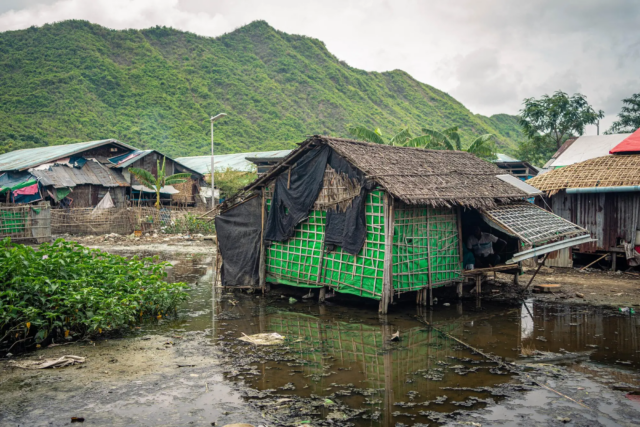
In 2012, when violence erupted between Rohingya and Rakhine communities, Zaw Rina’s home in Pauktaw town was burned down. She was forced to flee with her family to a camp in Ah Nauk Ywe, on an island in the remote western part of the state. The impermanence of the fragile bamboo structure she lives in now belies the decade she has spent in the camp.
Flimsy shelter next to flimsy shelter line narrow, muddy pathways through the overcrowded camps in which more than 5,000 people live. Drainage is insufficient, with puddles of stagnant water a breeding ground for mosquitos and disease. There are too many people for too few toilets, while low water supplies, particularly in the dry season, means the facilities are typically filthy. Privacy is almost impossible to find.
Violence in 2012 that saw Zaw Rina’s home destroyed and killed hundreds, drove some 140,000 people, both Rohingya and Kaman Muslims, into these camps. Most remain there today where they have limited freedom of movement, denying them access to paid work, education and healthcare. Many embark on perilous journeys over sea and land to Bangladesh and Malaysia in the hope of a better life.
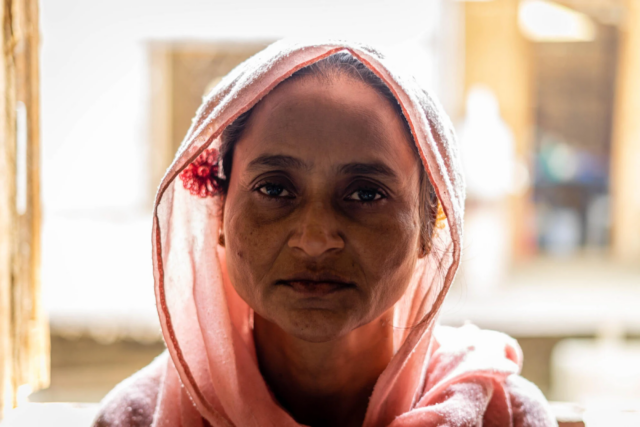
Zaw Rina receives mental healthcare services at MSF’s clinic in Ah Nauk Ywe camp in Rakhine state’s Pauktaw township. Myanmar, March 2022.
BEN SMALL/MSF
The impact on mental health
The day-to-day existence for Zaw Rina and thousands of others like her living in Rakhine state is underlined by fear, struggles to afford food, and feelings of hopelessness. This protracted status quo has drastic consequences on mental health.
The stress of living in these conditions was compounded when Zaw Rina’s 20-year-old daughter attempted suicide after her husband asked for a divorce.
“She was having a lot of serious fights with her mother-in-law and her husband turned around and said ‘I don’t like you and I want to get divorced, I did not marry you because I loved you’,” says Zaw Rina.
Across Myanmar, there are huge gaps in mental healthcare services. Rakhine state is no different, leaving people like Zaw Rina and her daughter with few options. There is one dedicated private mental health clinic in Sittwe, but it is too expensive for most people, while psychiatry services at the public hospital are hugely limited.
Exacerbating their challenges, the city is some 10 kilometres across the Kaladan River from the camps in Pauktaw township – both the distance and movement restrictions make it incredibly difficult for Rohingya living in camps to even reach these facilities.
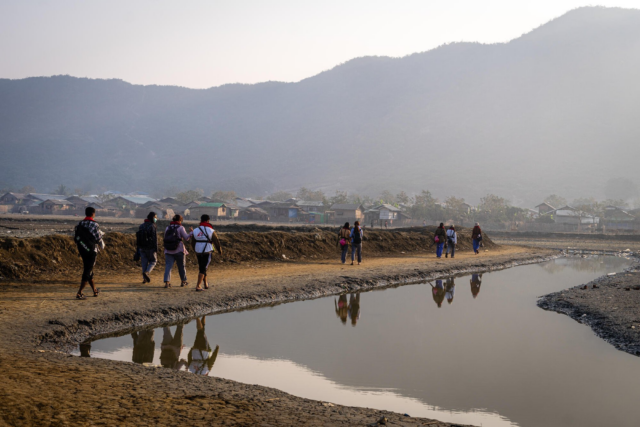
Through our clinics in the camps, we are able to come to Rohingya to provide vital mental healthcare support, with counsellors and doctors offering one-on-one appointments, group sessions and home visits. These services are available to anyone who comes to our facilities, no matter their ethnicity or religion.
Both Zaw Rina and her daughter received counselling from MSF, helping them better manage their symptoms. “I really felt lost and didn’t know where to ask for help until I met with the [MSF] counsellor,” she says. “I am feeling better now in terms of my mental health, a lot better, and for my daughter too.”
Struggling to earn an income from Sittwe’s ghetto
Although Daw Than Than was born to Buddhist parents in Mandalay, she married a Kaman Muslim, changed her religion and now lives together with Rohingya and Kaman in Aung Mingalar, a Muslim ghetto in the centre of Sittwe.
This is where the remnants of Sittwe’s Muslims, which used to number almost half the city’s 200,000 residents, live. The rest fled during the violence in 2012 or were forced into camps like the one where Zaw Rina lives. For 10 years, Muslims in downtown Sittwe have been confined to this small neighbourhood, denied freedom to move and with police outposts guarding it day and night.
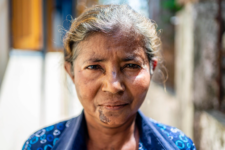
“I feel sad because I struggle alone in my life. I feel lonely and sad because I have no one to support me when I feel sick. I can’t afford to go to a private hospital,” she says, adding how she does not have enough money to eat properly, often subsisting on rice and green tea.
Every Friday, MSF opens a clinic in Aung Mingalar where people from within the ghetto come to receive basic healthcare, mental health support and treatment for non-communicable diseases. “When I speak [to MSF counsellors], I feel some relief. They help me with breathing exercises, which are really helpful for relaxing. During counselling sessions, I cannot control my feelings though, and I cry,” says Daw Than Than
Violence exacerbating Rohingya women’s mental health
The challenging, stressful conditions in which Rohingya are detained in cramped camps, with limited economic opportunities and reliant on humanitarian assistance leaves women and girls at greater risk of abuse, sexual harassment and domestic violence.
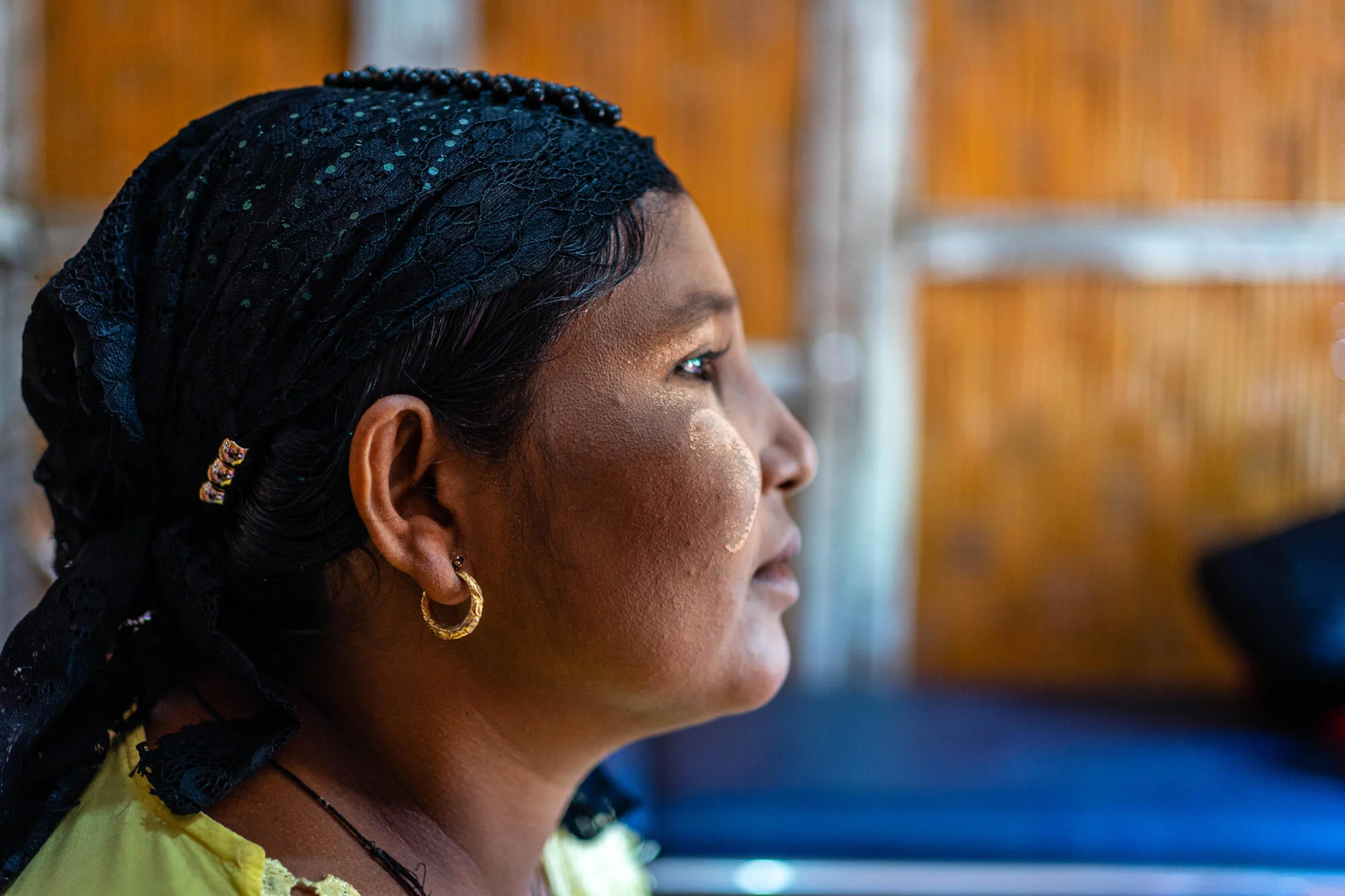 KHIN PHYU OO, MSF PATIENT
KHIN PHYU OO, MSF PATIENT
“I have no one to open up to [in the community]. Nobody wants to listen to me. I am happy to come here and say everything that is on my mind.
Announcements
21 May 2025
Open letter: Malaysia must lead ASEAN with principle, not hypocrisy, to address the Myanmar crisis

Progressive Voice is a participatory rights-based policy research and advocacy organization rooted in civil society, that maintains strong networks and relationships with grassroots organizations and community-based organizations throughout Myanmar. It acts as a bridge to the international community and international policymakers by amplifying voices from the ground, and advocating for a rights-based policy narrative.